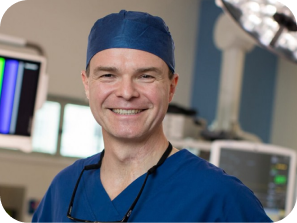
Our bariatric surgery expert details the weight loss surgery journey -
from pre-surgery decisions to post-surgery recovery and beyond.
Making the decision to have bariatric surgery
The decision to have weight loss surgery is a significant and personal one. It often stems from a combination of factors. These include health concerns, the desire for a better quality of life, and adverse experiences associated with obesity – such as weight stigma and poor body image.
Before choosing to pursue weight loss surgery, here are some things you can do.
● See your GP for a health assessment and talk about your thoughts. They can explain whether you are eligible for surgery and refer you to a weight loss surgery expert.
● Learn more about the different types of weight loss surgeries, their risks and benefits, and the expected outcomes.
● Talk to people who’ve had a weight loss procedure. You might have family or friends you can contact, or you could join an online forum or support group.
● Start making healthy lifestyle changes. Weight loss surgery is a tool, not an easy fix. You need to be dedicated to making dietary and lifestyle changes to achieve long-term success. Do what you can to start making those changes now.
Finding a specialist or doctor
Choosing a bariatric surgery expert is one of the biggest decisions you’ll make. It’s important to find someone who is qualified and experienced. You’ll be working closely with your surgeon (and their health professional team) for several months, so it’s also essential to find someone you feel comfortable with.
Choosing a specialist or doctor
Your first consultation
Your first visit is an important one because it sets the course for what happens next. While the specifics will vary from one person to another, here’s what you can usually expect during your initial consultation:
● Medical assessment – your surgeon will review your medical history, including any underlying conditions that may impact the surgery.
● Eligibility assessment – your surgeon will do some tests and ask some questions to see if you are a suitable candidate for weight loss surgery.
● Discussion about your treatment options – including the different weight loss surgery options if you are eligible.
● Goal setting – your surgeon will explain what you can expect to achieve with weight loss surgery and help you set realistic and achievable goals.
● Opportunity to ask questions – you’ll have the chance to discuss any concerns and ask questions.
Before the surgery
You’ll need to take several steps in the weeks leading up to surgery. These include:
● Pre-operative diet – some surgeons require you to follow a specific diet in the weeks before surgery. This diet helps to reduce the size of your liver, which helps the surgery go more smoothly.
● Medical tests – you might need to have additional tests to check your health status and make sure you are fit enough to have the procedure.
● Mental preparation – many people benefit from seeing a mental health professional to prepare for weight loss surgery and the changes that occur afterwards.
● Building your support network – let your family and friends know about your decision and take advantage of any offers of help.
● Planning for your recovery – now is a good time to get organised for when you come home from hospital. You can stock up on the foods you’ll need, arrange for someone to pick you up from hospital, and let work know how much time off you’ll need.
● Giving informed consent – you will need to read and sign some paperwork to state that you understand what your decision to have surgery involves, including the costs and potential risks.
It's crucial to follow your healthcare team’s instructions. They will stay in touch with you throughout this phase to discuss any concerns and answer your questions.
Day of surgery
When the day arrives, here’s an overview of what you can expect. After arriving at the hospital, you’ll check in and fill out some paperwork. Then you’ll be taken to an area where you get ready before surgery. Expert, caring nursing staff will be there to support you through each step.
You’ll change into a hospital gown and your clothes will be stored away. You might have a drip put in place to give you fluids and medications. Your anaesthetist and surgeon will see you to go over the surgical plan, answer any questions, and confirm your consent for the surgery.
During the surgery
When the surgical team are ready, you’ll be taken into the operating theatre. Your anaesthetist will give you an anaesthetic to make sure you are asleep throughout the procedure. The type of anaesthesia they choose will depend on the procedure and your medical history.
What happens during surgery will depend on the type of procedure. However, your surgical team will start by setting up surgical drapes and wiping the area down with medical grade antiseptic to reduce the risk of infection.
Once you’re under anaesthetic, the surgical team will complete the weight loss surgery according to the agreed plan. This can take between approximately 45 minutes and four hours.
Most types of weight loss surgery are done laparoscopically. This involves making several small incisions through which your surgical team can pass instruments. They use these special surgical instruments to perform the procedure. Rarely, your surgeon may need to make a traditional open incision.
Your surgeon will conduct the surgery then close the incisions and cover them with dressings.
You will wake up in recovery, where our attentive team will continue to monitor your vital signs and progress. When you’re ready, you’ll be taken to a ward to continue your recovery.
Recovery from surgery
Most people can expect to stay in hospital for one to two nights after laparoscopic surgery. Nursing staff will monitor you and you’ll receive support to get moving.
It’s normal to experience some discomfort after any kind of surgery. This usually settles quickly after weight loss surgery, and you can have medications to assist with pain management. Your surgeon will come to see you. You might also be seen by a physiotherapist and a dietitian.
Before you go home, you’ll be given all the information you need to continue your recovery. You’ll start on your post-operative diet, which usually consists of liquid foods to start, gradually progressing to solid foods over several weeks. Your surgeon or dietitian will explain this to you in detail.
You’ll need to take things easy at first. You can usually begin light walking a few days after surgery and gradually build up to your usual activity levels. Most people need about two weeks off work.
You’ll have regular follow-up appointments with your surgical team to monitor your progress and address any concerns.
Recovery after weight loss surgery
Life after weight loss surgery
Once you’ve recovered from surgery and life moves on, you’ll notice some significant changes in your body. Most people lose weight rapidly in the months after surgery. You can expect to keep losing weight for 8 to 15 months, sometimes more.
Once the tiredness from surgery settles, you should have more energy. This will help you to get more active. Many people also sleep better and feel better in themselves.
You’ll get used to the dietary and lifestyle changes, but some people find this harder than others. If you find yourself falling back into unhealthy habits or struggling to cope with the changes, it’s a good idea to see your weight loss team and mention it to them during your regular follow ups. Help from a dietitian and psychologist or counsellor can make all the difference to your long-term success. You might also like to continue with a support group, either in-person or online.
After bariatric surgery it is strongly recommended to have regular blood tests to check for vitamin and micronutrient levels and follow up is important. Significant weight loss can cause symptomatic gallstones, which may require the gallbladder to be removed. If you have symptoms contact your surgeon or GP. Loose skin is frequently noticed as well. Once your weight has stabilised the excess skin can be removed by a plastic surgeon.
And remember, your specialist is always happy to help, so don’t hesitate to get in touch at any time.
Reviewed by
A/Prof Harald Puhalla
General Surgeon
at Gold Coast Private Hospital.
*Whilst effort is made to ensure that the information contained on this website is accurate and informative and it has been reviewed by a qualified medical practitioner, the information is general in nature, and it should not be used as a substitute for obtaining your own professional or medical advice. Any timeframes or quantitative data including but not limited to estimated timeframes for recovery following a procedure, time required for the procedure, timeframes for weight loss and/or estimated total weight loss are general in nature and your experience, outcomes and results may vary.
Do not use the information:
- to diagnose, treat, cure or prevent any disease;
- for therapeutic purposes; or
- as a substitute for the obtaining the specific advice of a health professional.
Healthscope Ltd and its related entities do not provide any guarantees, and assumes no legal liability or responsibility for the accuracy, currency or completeness of the information contained on this page or on our website, or for any injury, loss or damage caused by its use.

We’re here to help
Need further assistance?
For
general
enquiries on bariatric surgery
please contact us.
Weight loss surgery
Surgery guide
Resources
Healthscope is one of Australia's largest private hospital operators, with 36 private hospitals across all states and territories. Our hospitals provide services in acute care, mental health and rehabilitation.
At Healthscope, we are committed to delivering industry-leading care and strive to make sure that our patients have the best possible experience when they come to our hospitals.
2025 Healthscope All rights Reserved Privacy Policy



